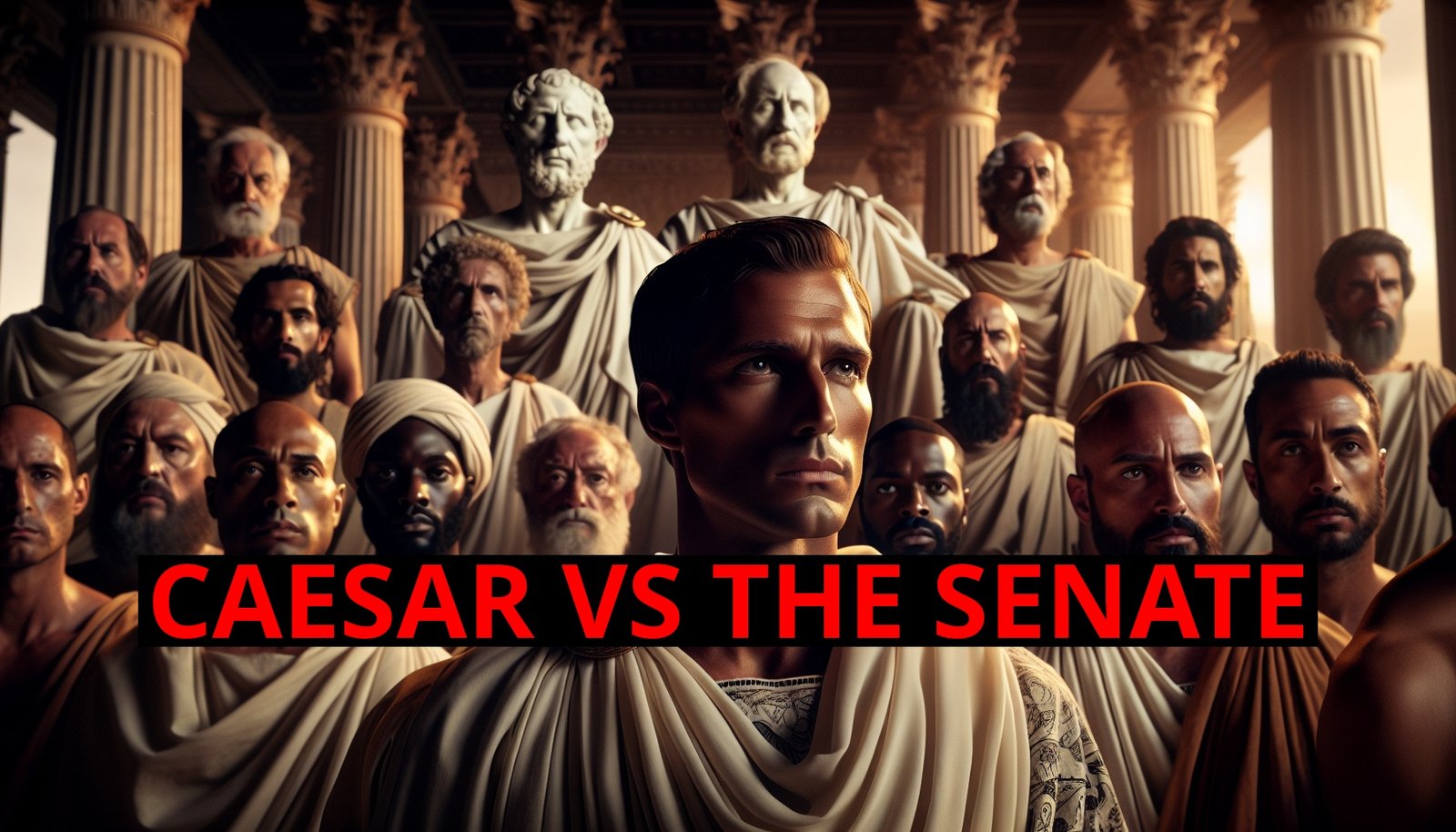Julius Caesar: dictator, tyrant, or champion of the people? For centuries, we’ve been told that Caesar was the villain who brought down the Roman Republic. But is the story really that simple? What if Caesar wasn’t the enemy of democracy, but actually the one trying to fix a broken system? The Roman Senate—those so-called defenders of democracy—certainly painted Caesar as a dictator. But in reality, they had a much different agenda. Let’s take a closer look at how the Senate used democracy as a tool for their own gain and how Julius Caesar found himself on trial for challenging their power.
The Roman Republic loved to present itself as the ultimate democracy, where citizens had a say in government through voting and representation. But in practice, things were far different. The real power was concentrated in the Senate—an elite group of aristocrats who controlled the money, the military, and the most important political offices. The Republic wasn’t a democracy as we think of it today; it was more of an oligarchy. The Senate’s main concern wasn’t the people—it was maintaining the status quo, ensuring that power stayed in the hands of a few wealthy families. And when the people called for reforms, the Senate resisted. They used the language of democracy to justify their opposition, claiming to defend the Republic, but in truth, they were defending their privileges.
Julius Caesar’s rise to power wasn’t a sudden grab for control. It was the result of years of growing popular support. His military victories in Gaul made him a hero to the Roman lower classes and veterans, many of whom were desperate for change. Caesar saw the growing inequality in Rome and the suffering caused by debt and unfair land distribution. His bold reforms sought to address these problems—land for veterans, debt relief for struggling citizens, and greater representation for those living in the provinces. These reforms were immensely popular with the masses, but they struck fear into the Senate.
Why was the Senate so threatened by Caesar? Because his reforms targeted their power. The Senate’s wealth and influence were tied to their vast landholdings and financial control. Any move to redistribute land or reduce debt directly threatened their grip on power. To the Roman people, Caesar wasn’t a tyrant—he was the leader they needed, someone who could bring real change. But to the Senate, he was a dangerous threat to their authority. The Senate’s decision to label Caesar a dictator wasn’t about defending Roman democracy—it was about protecting their own power and influence.
The hypocrisy of the Senate becomes clear when you consider their own behavior. While they accused Caesar of seeking kingship and dismantling the Republic, they had no problem manipulating the political system to maintain control. The Senate had a long history of blocking reforms that benefited the poor and using violence against popular leaders like the Gracchi brothers, who had also fought for land reform. Their accusations of dictatorship against Caesar were a convenient cover for their true motive: preserving their privileged position.
In 49 BCE, Caesar faced a fateful decision. The Senate had blocked his political future, branded him a criminal, and left him with no option but to cross the Rubicon River with his legions. This act, often cited as the moment Caesar revealed his ambition for power, was more complex than that. Caesar wasn’t marching on Rome simply to seize control—he was defending himself against a Senate that had made it clear they wouldn’t allow him to return to politics without facing persecution. His crossing of the Rubicon wasn’t the act of a dictator in the making; it was a response to the Senate’s undemocratic tactics.
The Senate, of course, claimed they were defending the Republic from Caesar’s supposed dictatorship. But in reality, they were trying to prevent anyone outside their elite circle from rising to power. Their cries of “tyranny” were more about protecting their own control over the state than saving democracy.
After Caesar’s assassination in 44 BCE, the Senate claimed they had restored the Republic. But the reality was far different. Rome fell into chaos as factions battled for control, and eventually, Caesar’s adopted heir, Octavian, emerged as the victor. This marked the end of the Roman Republic and the birth of the Roman Empire. So, who was really responsible for the fall of the Republic? While Caesar’s actions certainly played a role, the Senate’s refusal to adapt to changing political realities was a major factor. Their hypocrisy in defending a democracy that had long been broken only accelerated the Republic’s decline.
In the end, calling Julius Caesar a dictator oversimplifies a much more complex political story. Caesar rose to power with the support of the people, offering reforms that addressed the real problems facing Rome. The Senate’s opposition wasn’t about protecting democracy—it was about protecting their own power. They used the language of democracy to manipulate public opinion, framing Caesar as the villain, when in truth, they were the ones undermining the Republic.
The Senate’s version of democracy was selective, and their refusal to embrace necessary reforms led to the collapse of the Republic. While Caesar’s rise marked the end of the Roman Republic, it also exposed the deep weaknesses in a system controlled by an elite few. So, was Julius Caesar really the villain, or was he just the leader who exposed the Senate’s hypocrisy for what it was? You decide.
Thank you for watching this exploration of Roman history and politics. If you enjoyed this video and want more content like this, be sure to subscribe and hit the notification bell so you don’t miss our next dive into the fascinating stories from the ancient world.













